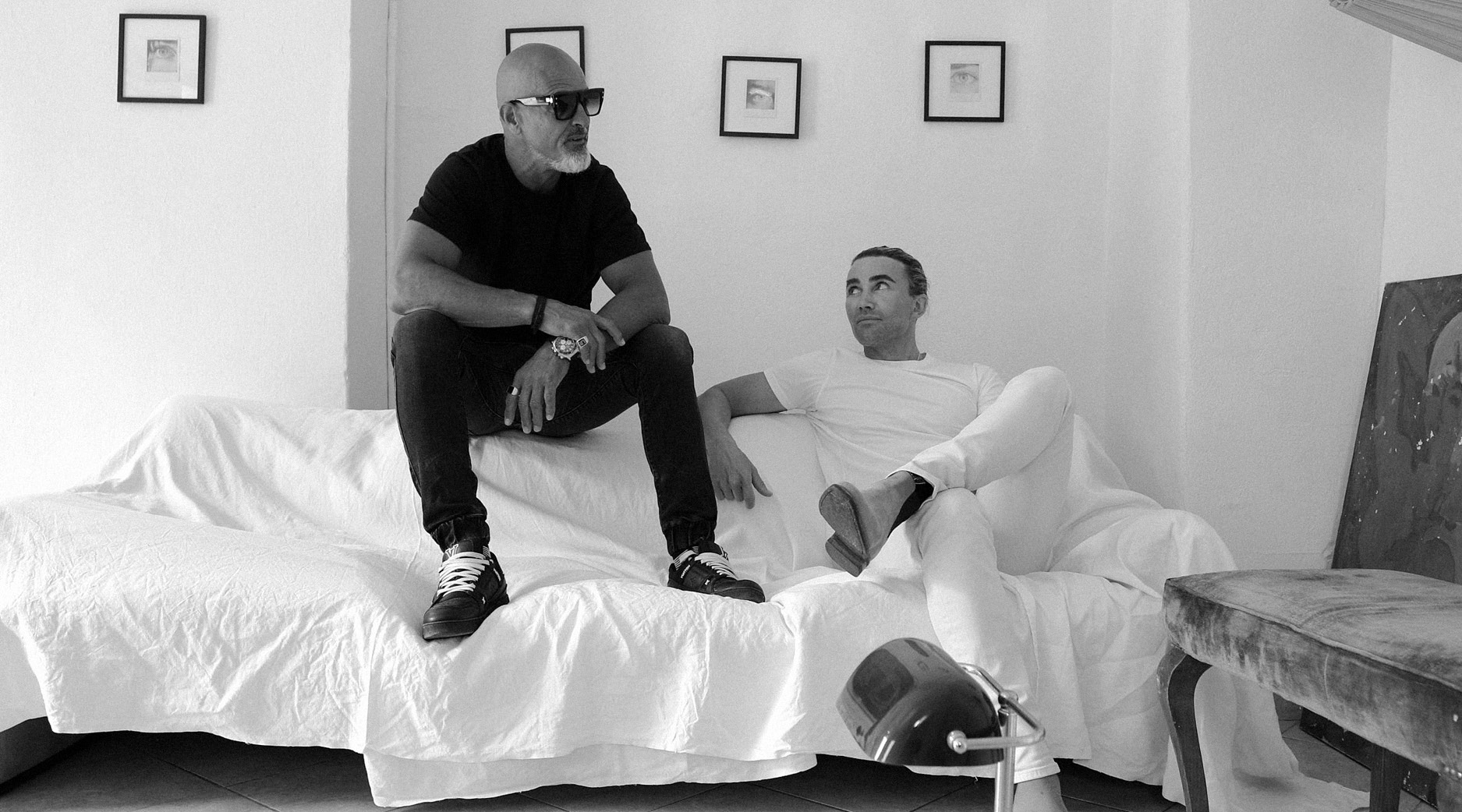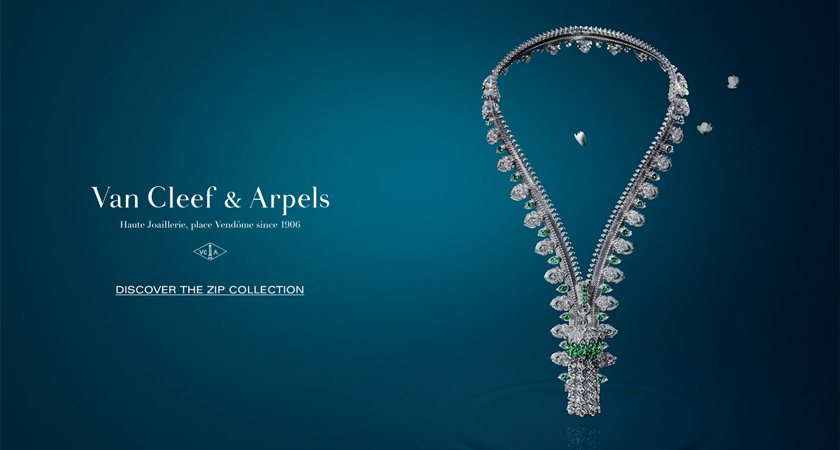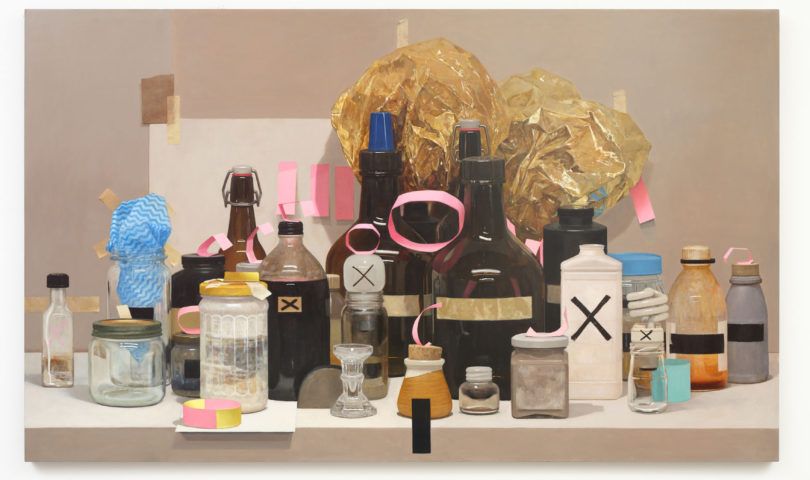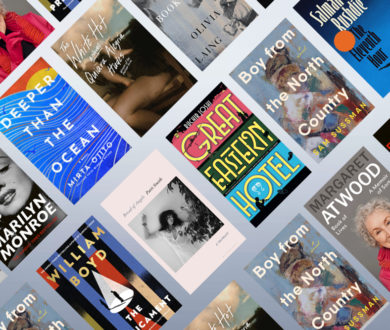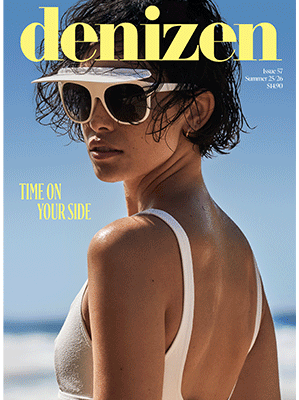As the saying goes, opposites attract, which is undoubtedly true for iconic sporting legend and renowned larrikin Matthew Ridge and Auckland-born David Ring. Unlikely friends (self-admittedly), the pair, affectionately referred to as Ridgey & Ringo, bonded over their shared experiences — the good, the bad, and the ugly — and the easy way in which they could open up to one another. Their friendship has morphed into something more meaningful and personal with The Brink — a podcast which speaks to their own experiences and the facets of life that most shy away from, running the gamut from addiction to ADHD, sex to spirituality.
It takes real courage to reinvent yourself. Rip up your existing playbook, change course, and choose something else. But that is precisely what Matthew Ridge and David Ring have done, both in their own, unique way. Matthew Ridge has worn many hats in his life: All Black, Rugby Coach, TV Presenter, and man-about-town, to name a few. But, as I quickly discover, he is far from the sum of those parts. The Ridgey I encounter is a family man, a devoted friend, and someone wholly dedicated to bettering himself and helping those around him do the same. Don’t get me wrong, the cheeky, larrikin-loud, self-depricating jokester that was a permanent fixture on the TV screen when I was growing up is still very much there, but there’s a softness to him now, too, a thoughtfulness and sense of self-awareness that instantly endears me to him. And I know I’m not the only one.
A few years back, Ridge crossed paths with David Ring. His daughter, Jaime, introduced the pair, given they had both relocated to Europe (Ridge is now based in the South of France, Ring resides in Monaco). And despite, he tells me, being skeptical to begin with, “Jaime said, ‘Dad, Ringo has had a bit of work done, and I don’t want you coming out and asking him about his face’, but of course, I did bring it up — we were sitting having lunch in Monaco and I yelled across the table ‘Mate, I don’t care that you’ve had work, because it’s bloody good work!” — the connection was instantaneous. “We were able to talk about anything.”
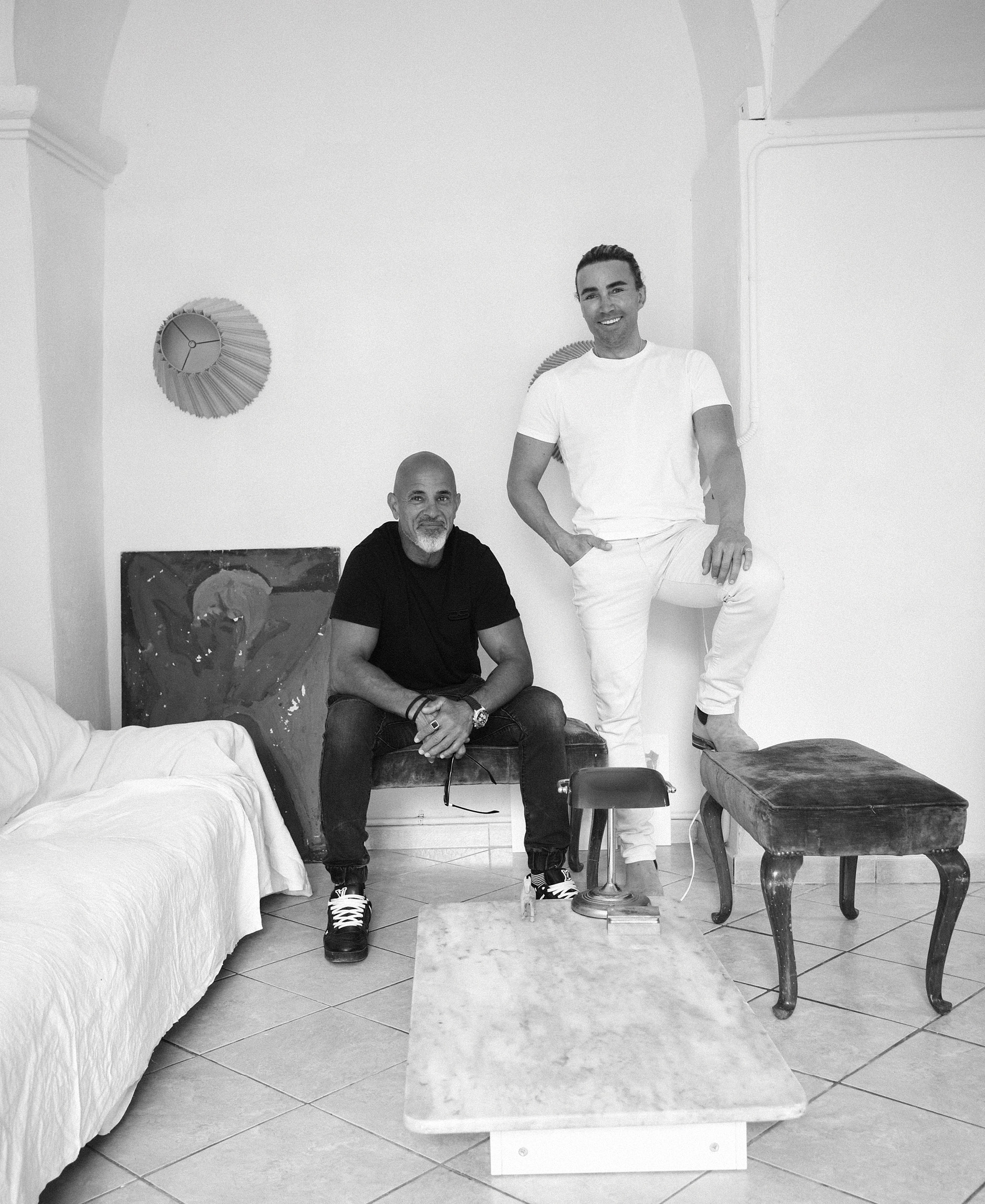
As their friendship developed, their conversations became more raw, more honest. They covered subjects they’d never dared speak about openly before — addiction, sexuality, and many of the issues that society shies away from, “Then I just said to him one day — I was just sort of halfway joking — I said mate we should start a podcast,” Ridge tells me, with Ring interrupting to say he was initially against the idea. “I’m deeply shy,” he admits, “I never thought I’d put myself out there in that capacity — I don’t share anything with anybody.” Ridge cuts in with, “But you share everything with me.” I find the moment unexpectedly moving. Eventually, Ring agreed to give it a shot, and — 60 episodes later — the rest is history.
I’m curious about what gave the unexpected duo the impetus to share themselves with the world. They tell me they both possess an innate desire to avoid anything superficial and share candidly, “We both have ADHD,” Ring tells me, “And because of that, I think we’re both just inherently unfiltered — it’s not through bravery or courage, but we’re just able to talk about our fuck ups and our experiences without feeling embarrassed.”
They both tell me, in their own ways, that they’ve always felt like they were on the outskirts, dancing on the periphery of groups and never quite fitting in anywhere. “There’s a level of pain in that,” says Ring, adding that when you meet someone who you can see lives that same reality, you can approach them or receive what they’re saying with more compassion and openness. “It allows a connection to go deep, really quickly.” And that’s exactly how their relationship evolved. Their friendship has been the catalyst for monumental change in both of their lives. Ridge tells me a night with Ring (who has been alcohol-free for some time) was the moment in which he decided to turn his life around, “We’d had a pretty big night, and I just turned to Ringo and said mate, that’s it, I’m not doing this shit again. I was sort of trying to numb myself — I was smoking like a train, I was drinking like a fish, I was just partaking in whatever was available, and I just said — that’s it for me. And it was.”
It was then that the pair went all-in with the podcast, which became a different form of outlet. “We’ll talk to somebody about an issue, whether it be addiction or ADHD or trauma, and we’re learning through those conversations why we do the things that we do, too,” says Ridge, “It’s kind of like we’re on this journey of self exploration. So it’s therapy for us, but we also have listeners coming on the journey too, and hopefully The Brink can then be the catalyst for people to look at their own lives and go, ‘This is where I’m at, and maybe I can take different steps or explore a different path forward.’”
“Ridge and Ring embrace and actively encourage course-correcting — whether in thought, opinion, or behaviour.”
That openness to learning, reflecting, and connecting extends beyond the podcast. Both come from different worlds, Ridge, the blue-collar sporting legend/lothario, and David, proudly gay and white-collar, but there’s an ease in how they move between spaces that draws on the fact that they’ve always navigated the edges of different social circles. And yet, despite the contrasts, there’s a shared ability to navigate different contexts — a comfort in both luxury and simplicity. It’s not about assimilation, but a genuine interest in people — an understanding that human connection is the only currency that matters.
One of the hallmarks of The Brink, and the reason the podcast instantly became a talking point, is Ridge and Ring’s lack of fear when it comes to speaking about things that many are afraid to address in today’s hyper-sensitive society. “People are too scared to say what they actually think,” says Ridge, “But a lot of the feedback we get is that people really like the rawness, honesty, and transparency of the podcast.” He continues, “It doesn’t matter if people agree with you or don’t agree with you. If you have an opinion and believe in it strongly, why should you be afraid to share it? Everyone’s entitled to an opinion.”
Ring agrees wholeheartedly, “I’d be bored senseless if I had to sit in a room with a homogeneous group of people who all agreed on the same politics, or had the same opinions, where we’re all just patting each other on the back, going, ‘Yeah, I agree.’ That would bore the shit out of me,” he reasons. The beauty, instead, is in being able to disagree, knowing there will be no judgement, no grudges, “At the end of the day,” says Ring, “We’ll get up and walk away, and then come back the next week and argue about something different — or agree on something different, and respect each other more for having a genuine point of view.”
Ridge and Ring embrace and actively encourage course-correcting — whether in thought, opinion, or behaviour. In a world that once demanded unwavering consistency, where past words or mistakes were etched in permanent record, the pair see power in the ability to shift perspective. With greater access to information and broader worldviews, opinions are no longer fixed — they’re fluid, responsive, and informed by growth. For them, changing your mind isn’t a sign of weakness; it’s evidence you’re paying attention.
They reject the idea that people should be forever defined by what or who they once were. If someone’s done the work to change, grown from their failures or shifted their outlook, why hold them hostage to the past? Whether it’s interviewing someone with a chequered history who’s now giving back to their community, or recognising their own unconscious biases, Ridge and Ring are unafraid to reflect and recalibrate. In their world, personal evolution isn’t just accepted, but essential. “We’re all brought up in a certain way, but if you get more information that changes your opinion or way of living and decide to change tack, that can only be a good thing,” says Ridge.
This level of awareness and compassion almost certainly comes from how much Ridge and Ring have changed over the years. Once both notorious party boys, the pair now live a life centred on personal growth, having both adopted practices like meditation and delved into spirituality to better understand themselves and those around them. They are, by and large, the perfect poster boys for how much there is to be gained from a willingness to change. There’s real bravery in saying ‘I was wrong and I can do better’, or acknowledging that the way you were living wasn’t sustainable and deciding to start from scratch, both evolving into inspiring examples of how your past doesn’t have to dictate or define your future.
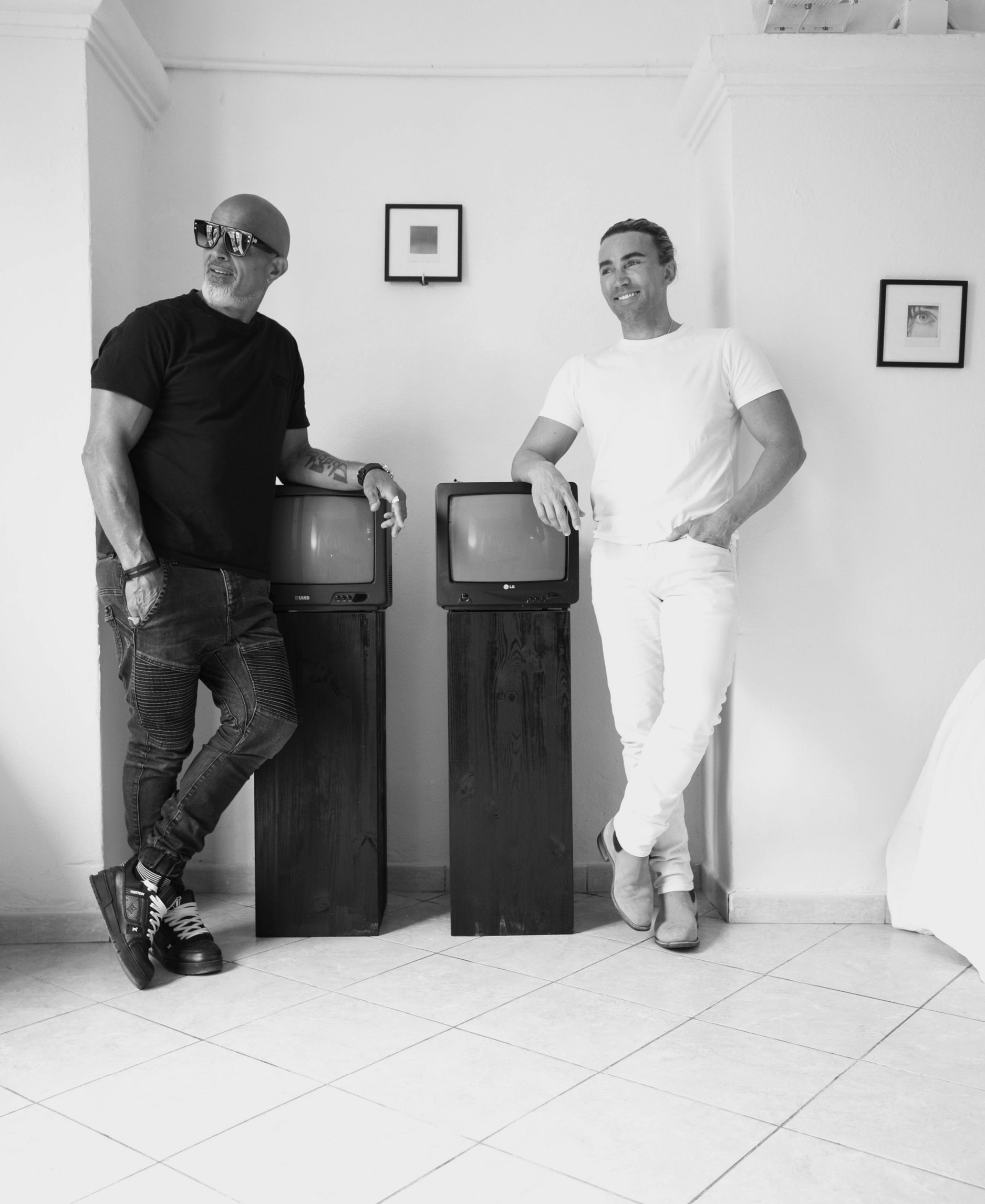
For both men, their most significant turning point has been sobriety. “One of the things I’m most proud of in my life is going to rehab and overcoming my alcoholism,” says Ring. “I think it’s an experience that a lot of people would be slightly embarrassed about, but for me, it’s the opposite.” He adds that it was far from a walk in the park and remains a lifelong journey. But what he learnt from the experience has changed his worldview, “I’ve seen first-hand how hard real change can be; how much work is required, and I think that’s afforded me a real empathy for other people in the throes of suffering. I can look at somebody like that with understanding, whereas maybe once upon a time I would have looked upon that with hardness and judgement — unintentional bias.” He adds, rather profoundly, “I think through your own suffering, you learn to find space for the suffering of others.”
Ridge has been on a similar journey regarding overcoming bias, “I was so judgemental when I was younger,” he admits. “I think we all were. We’re raised to ‘other’ ourselves — to keep ourselves separate. If you see yourself as better than somebody else, it keeps you safe.”
Since leaving New Zealand, both men agree their worldviews have broadened significantly. For Ring, it began with a move to Los Angeles, where the diversity of culture, perspective, and lived experience offered a kind of belonging he hadn’t previously known. “It was the first time I ever felt comfortable in my skin,” he reflects. “New Zealand still has a certain cultural homogeneity to it. If you don’t quite fit that mould, you feel like you’re on the outside.” Later, moving to Monaco brought its own kind of surprise. “I thought it would be pretentious and the people would be cold, but it’s actually one of the warmest, most open places I’ve ever lived,” he says, noting the unexpected friendliness and shared camaraderie among people who’ve all, in some way, started over.
“Once both notorious party boys, the pair now live a life centred on personal growth. They are, by and large, the perfect poster boys for how much there is to be gained from a willingness to change.”
Ridge echoes that sentiment, though his transformation has come not just from his surroundings, but from what those surroundings have allowed him to confront. “To grow, you need to spend time with yourself,” he says plainly. “And I’ve been able to do that here.” While he doesn’t claim to be fully immersed in the culture — “The French are… different,” he laughs; he’s found the light, the slower pace, and the everyday interactions in the South of France grounding. “The weather makes a massive difference to your mental state,” he says. “If the sun’s shining, everything just feels easier.” And what he’s gained from that simplicity is clarity: on who he is, what matters, and how he chooses to show up. “I just try to be kind to everyone I encounter. It costs nothing,” he adds.
The two agree that this change of pace and shift in culture has significantly shifted the dial when it comes to their mental states. Ridge, in particular, could never have predicted how much his life would change. “If you’d told me two years ago, ‘You won’t drink. You definitely won’t smoke. You’ll be meditating every day, and you’ll be taking time out on your own every day and working on yourself, getting comfortable with yourself, and sitting in silence, I’d be like, ‘What the hell?’” But, what it all boils down to, he tells me, is simplifying his life — getting back to basics and prioritising what matters: community, connection, family, health. The rest is all just noise.
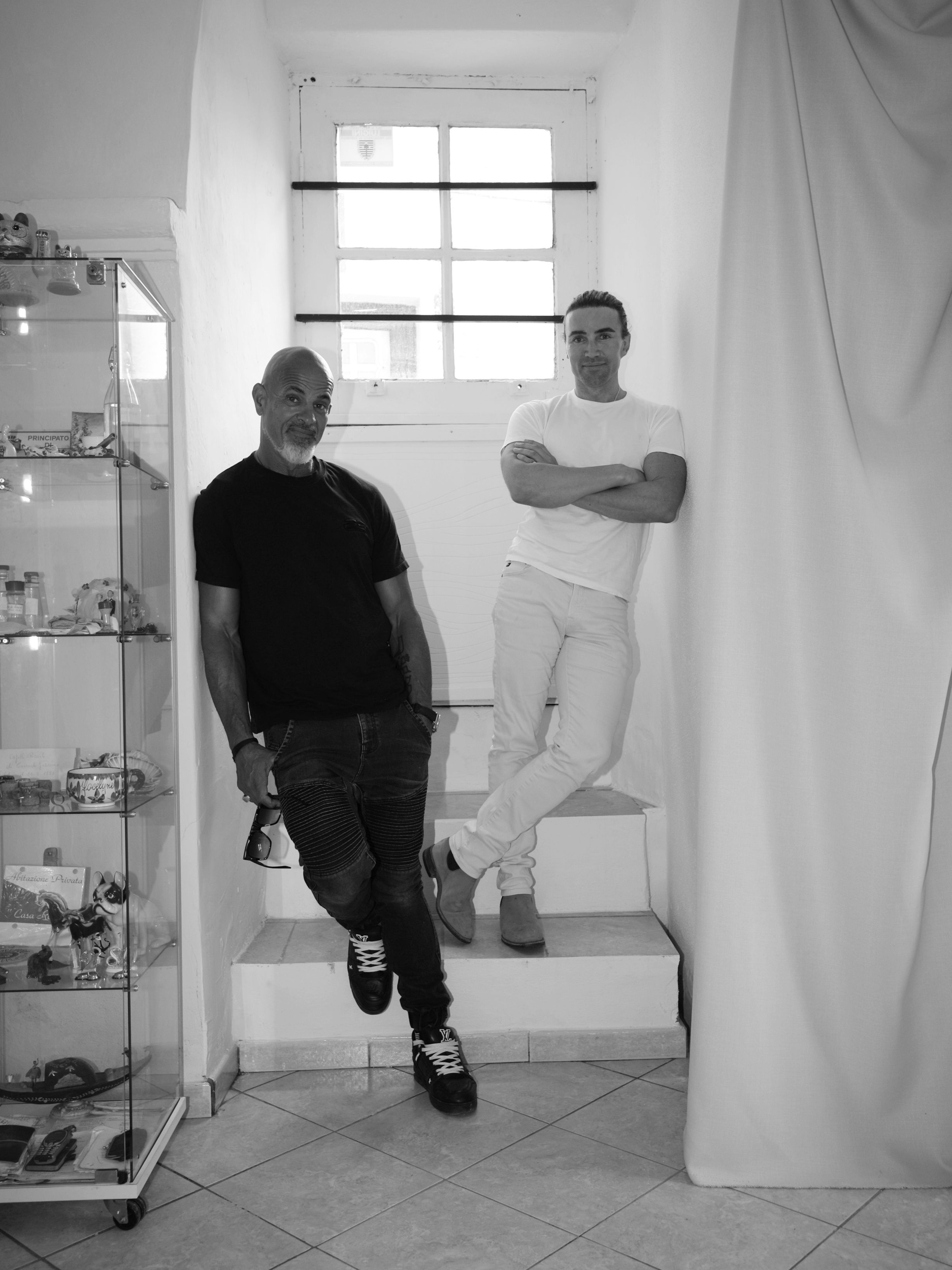
For both men, this ability to slow down, to be truly present, has become one of the most radical changes in their lives, especially for Ridge, who for years wore the mask of the hardened, hyper-masculine achiever. “We live inside our heads,” he says, “worrying about stuff we can’t control, rehearsing futures that may never happen.” It wasn’t until he began consciously shifting his awareness, particularly while raising his youngest children, that he realised how much of life he’d missed by not being in the moment. “When my older kids were growing up, I was there, but I wasn’t present,” he reflects. “I was always somewhere else in my mind, thinking about the next meeting, the next phone call, the next thing on the list. Now, I’m just here — and the little joys we all forget how to enjoy, like kicking a ball around in the sun or a quiet cup of tea — are everything.”
This softening, this grounded stillness, may come as a surprise to those who only knew Ridge in his more public-facing chapters. But it’s clear that this shift is not performative — it’s deeply felt, hard-won, and profoundly integrated into the man he is today. “You’ve got to slow yourself down,” he says. “No one’s going to care who Matthew Ridge was. So why get so caught up in your ego? Just relax and stay in the moment.” Ring agrees, noting that the Ridge we now see — the thoughtful, emotionally articulate version — may not align with the image many have held onto. “But it’s always been there,” he adds. “It just wasn’t what people were looking for at the time.”
Ring, too, is on a journey that is uniquely his own, quietly building a life of meaning that perhaps sits at odds with what those who have known past versions of him might expect. “I’m far from perfect, but the point is that we’re both consciously trying to improve ourselves every day. And I think that if all of humanity did the same, we’d be in a much better place.”
Now, through The Brink, they’ve both found an outlet through which they get to show up as their full, authentic selves: curious, contradictory, and ever-evolving — perhaps for the very first time. Better late than never.

